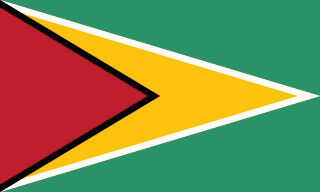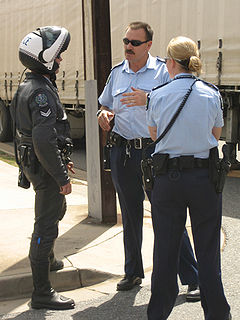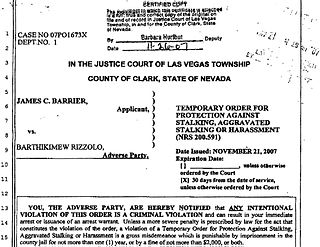
A restraining order or protective order is an order used by a court to protect a person, business, company, establishment, or entity, and the general public, in a situation involving alleged domestic violence, assault, harassment, stalking, or sexual assault. In the United States, every state has some form of domestic violence restraining order law, and many states also have specific restraining order laws for stalking and sexual assault.

Human rights in Brazil include the right to life and freedom of speech; and condemnation of slavery and torture. The nation ratified the American Convention on Human Rights. The 2017 Freedom in the World report by Freedom House gives Brazil a score of "2" for both political rights and civil liberties; "1" represents the most free, and "7", the least.
With respect to human trafficking, Saudi Arabia was designated, together with Bolivia, Ecuador, Qatar, United Arab Emirates, Burma, Jamaica, Venezuela, Cambodia, Kuwait, Sudan, Cuba, North Korea, and Togo, as a Tier 3 country by the United States Department of State in its 2005 Trafficking in Persons Report required by the Victims of Trafficking and Violence Protection Act of 2000 on which this article was originally based. Tier 3 countries are "countries whose governments do not fully comply with the minimum standards and are not making significant efforts to do so." The 2006 report shows some effort by the Kingdom to address the problems, but continues to classify the Kingdom as a Tier 3 country. The report recommends, "The government should enforce existing Islamic laws that forbid the mistreatment of women, children, and laborers..."
Japan is a constitutional monarchy. According to Ministry of Justice (MOJ) figures, the Japanese Legal Affairs Bureau offices and civil liberties volunteers dealt with 359,971 human rights related complaints and 18,786 reports of suspected human rights violations during 2003. Many of these cases were ultimately resolved in the court. Human rights issues occur in present-day Japan, as modernization history of Japan only reached in the non-humanity areas with the rise of military expansion of Empire of Japan in the 20th century. due to the rights of the citizens the republic causes a cascade in the government
Current issues concerning human rights in Albania include domestic violence, isolated cases of torture, and police brutality, the general condition of prisons, human and sex trafficking and LGBT rights.

The Protection of Women from Domestic Violence Act 2005 is an Act of the Parliament of India enacted to protect women from domestic violence. It was brought into force by the Indian government from 26 October 2006. The Act provides for the first time in Indian law a definition of "domestic violence", with this definition being broad and including not only physical violence, but also other forms of violence such as emotional/verbal, sexual, and economic abuse. It is a civil law meant primarily for protection orders and not meant to penalize criminally. The act does not extend to Jammu and Kashmir, which has its own laws, and which enacted in 2010 the Jammu and Kashmir Protection of Women from Domestic Violence Act, 2010.
Brazil's Federal Law 11340, also known as Lei Maria da Penha targets gender based violence in Brazil, with the specific aim of reducing domestic violence in the country. Sanctioned on August 7, 2006 by former President Luiz Inácio Lula da Silva and subsequently implemented on September 22, 2006, the law is an important contribution to an international movement of criminalizing violence against women. The name of the law is an homage to the Brazilian activist Maria da Penha Maia, a former victim of domestic violence.

Human rights in Andorra are generally respected by the government, and the law and the judiciary provided effective means of dealing with individual instances of abuse. However, prolonged pretrial detention and violence against women and children were reported.

Human rights in Austria are generally respected by the government; however, there were problems in some areas. There were some reports of police abuse and use of unjustified force against prisoners. Antisemitic incidents, including physical attacks, name-calling, property damage, and threatening letters, telephone calls, and Internet postings occurred during the year. There was some governmental and societal discrimination against fathers, Muslims and members of unrecognized religious groups, particularly those considered "sects". There were incidents of neo-Nazi activity, rightwing extremism, and xenophobia. Trafficking in women and children for prostitution and labor also remained a problem.
Violence against women in Peru is defined as harassment or violence propagated against those who are born women. Intimate partner violence (IPV) is the most common form of gender-based violence that occurs though it can occur concurrently with sexual and emotional violence.
Suriname is principally a destination and transit country for men, women, and children trafficked transnationally for the purposes of commercial sexual exploitation and forced labor. It is also a source country for underage Surinamese girls, and increasingly boys, trafficked internally for sexual exploitation. Some of these children are trafficked into the sex trade surrounding gold mining camps in the country’s interior. Foreign girls and women from Guyana, Brazil, the Dominican Republic, and Colombia are trafficked into Suriname for commercial sexual exploitation; some transit Suriname en route to Europe. Chinese men are subjected to possible debt bondage in Suriname, and are subject to forced labor in supermarkets and the construction sector. Chinese women reportedly are exploited sexually in massage parlors and brothels. Haitian migrants, typically en route to French Guiana, sometimes are forced to work in Surinamese agriculture. The Government of Suriname does not fully comply with the minimum standards for the elimination of trafficking; however, it is making significant efforts to do so. The government sustained a moderate level of law enforcement action against trafficking crimes, and modestly improved victim assistance and prevention efforts. However, official complicity with suspected trafficking activity is an area for concern.
In Australia, domestic violence is defined by Family Law Act 1975 as "violent, threatening or other behaviour by a person that coerces or controls a member of the person's family, or causes the family member to be fearful".
Indonesia is a source, transit, and destination country for women, children, and men trafficked for the purposes of commercial sexual exploitation and forced labor. The greatest threat of trafficking facing Indonesian men and women is that posed by conditions of forced labor and debt bondage in more developed Asian countries and the Middle East. The government stopped permitting Indonesian women to travel to Japan and South Korea as “cultural performers,” to curtail a practice that led to victims being trafficked for commercial sexual exploitation. However, in 2007 traffickers increasingly used false documents, including passports, to obtain tourist visas for women and girls who are subsequently forced into prostitution in Japan, through the unlawful exploitation of recruitment debts as high as $20,000 each. Trafficking of young girls to Taiwan as brides, mainly from West Kalimantan, persisted. Traffickers use false marriage licenses and other false documentation in order to obtain visas and subsequently force the women and girls into prostitution. Women from the People’s Republic of China, Thailand, and Eastern Europe are trafficked to Indonesia for commercial sexual exploitation, although the numbers are small compared with the number of Indonesians trafficked for this purpose. A significant number of Indonesian men and women who migrate overseas each year to work in the construction, agriculture, manufacturing, and domestic service sectors are subjected to conditions of forced labor or debt bondage in Malaysia, Saudi Arabia, Iraq, Singapore, Taiwan, Hong Kong, United Arab Emirates, Jordan, Kuwait, Qatar, Syria, France, Belgium, Germany, and the Netherlands. Malaysia and Saudi Arabia are the top destinations for legal and illegal Indonesian migrant workers who are trafficked for domestic servitude, commercial sexual exploitation, and forced labor. Some labor recruitment companies, known as PJTKIs, operated similarly to trafficking rings, luring both male and female workers into debt bondage, involuntary servitude, and other trafficking situations. Some workers, often women intending to migrate, entered trafficking and trafficking-like situations during their attempt to find work abroad through licensed and unlicensed PJTKIs. These labor recruiters charged workers high commission fees—up to $3,000—which are not regulated under Indonesian law and often require workers to incur debt to pay, leaving them vulnerable in some instances to situations of debt bondage. PJTKIs also reportedly withheld the documents of some workers, and confined them in holding centers, sometimes for periods of many months. Some PJTKIs also used threats of violence to maintain control over prospective migrant workers. Recruitment agencies routinely falsified birth dates, including for children, in order to apply for passports and migrant worker documents. Internal trafficking is a significant problem in Indonesia with women and children exploited in domestic servitude, commercial sexual exploitation, rural agriculture, mining, fishing, and cottage industries. Women and girls are trafficked into commercial sexual exploitation in Malaysia, Singapore, and throughout Indonesia. Indonesians are recruited with offers of jobs in restaurants, factories, or as domestics and then forced into the sex trade. Young women and girls are trafficked throughout Indonesia and via the Riau Islands, Kalimantan, and Sulawesi to Malaysia and Singapore. Malaysians and Singaporeans constitute the largest number of sex tourists, and the Riau Islands and surrounding areas operate a “prostitution economy,” according to local officials. Sex tourism is rampant in most urban areas and tourist destinations. A 2006 bilateral MOU between the Indonesian and Malaysian governments, governing the employment of an estimated one million Indonesian domestic workers in Malaysia, failed to provide adequate protection to Indonesian migrant workers and explicitly endorsed a practice that is widely seen as a potential facilitator of forced labor—the right of Malaysian employers to hold the passports of Indonesian workers. This agreement has not been amended to offer protections from forced labor conditions.
Evidence-based prosecution' refers to a collection of techniques utilized by prosecutors in domestic violence cases to convict abusers without the cooperation of an alleged victim. It is widely practiced within the American legal system by specialized prosecutors and state's attorneys and relies on utilizing a variety of evidence to prove the guilt of an abuser with limited or adverse participation by the abuser's victim, or even no participation at all.
Bahrain is a Source and destination country for men and women subjected to trafficking in persons, specifically forced labor and forced prostitution. Men and women from India, Pakistan, Nepal, Sri Lanka, Bangladesh, Indonesia, Thailand, the Philippines, Ethiopia, and Eritrea migrate voluntarily to Bahrain to work as domestic workers or as unskilled laborers in the construction and service industries. Some, however, face conditions of forced labor after arriving in Bahrain, through use of such practices as unlawful withholding of passports, restrictions on movement, contract substitution, non-payment of wages, threats, and physical or sexual abuse.
Namibia is a country of origin, transit, and destination for foreign and Namibian women and children, and possibly for men subjected to trafficking in persons, specifically conditions of forced labor and forced prostitution. Traffickers exploit Namibian children, as well as children from Angola and Zambia, through forced labor in agriculture, cattle herding, involuntary domestic servitude, charcoal production, and commercial sexual exploitation. In some cases, Namibian parents unwittingly sell their children to traffickers. Reports indicate that vulnerable Namibian children are recruited for forced prostitution in Angola and South Africa, typically by truck drivers. There is also some evidence that traffickers move Namibian women to South Africa and South African women to Namibia to be exploited in forced prostitution. Namibian women and children, including orphans, from rural areas are the most vulnerable to trafficking. Victims are lured by traffickers to urban centers and commercial farms with promises of legitimate work for good wages they may never receive. Some adults subject children to whom they are distantly related to forced labor or commercial sexual exploitation. Small business owners and farmers may also participate in trafficking crimes against women or children. Victims are forced to work long hours to carry out hazardous tasks, and may be beaten or raped by traffickers or third parties.
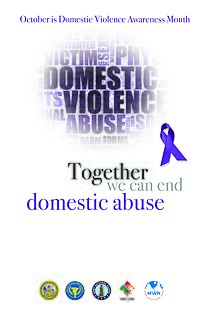
The management of domestic violence deals with the treatment of victims of domestic violence and preventing repetitions of such violence. The response to domestic violence in Western countries is typically a combined effort between law enforcement, social services and health care. The role of each has evolved as domestic violence has been brought more into public view.

Women in Brunei are women living in Brunei Darussalam. In their version of Islamic society, Bruneian women are regarded as persons of "very high status".
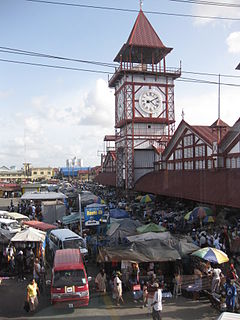
Crime in Guyana is investigated by Guyana's police.
Violence against women in Fiji is recognised to be "pervasive, widespread and a serious national issue" in the Pacific Island region. Fiji's rates of violence against women are "among the very highest in the world". The Fiji Women's Crisis Centre reports that 64% of women who have been in intimate relationships have experienced physical or sexual violence from their partner, including 61% who were physically attacked and 34% who were sexually abused.

